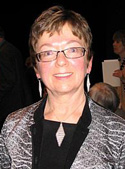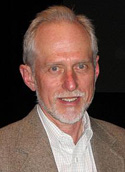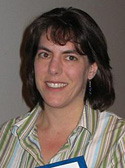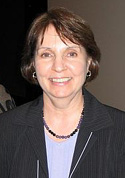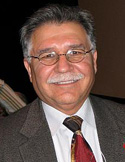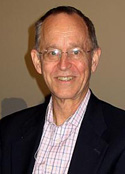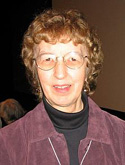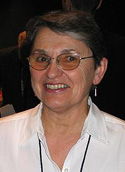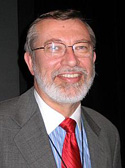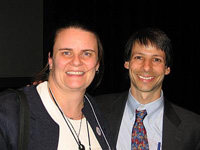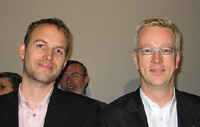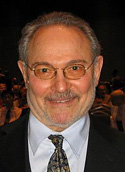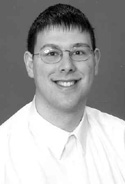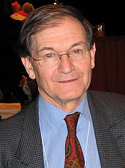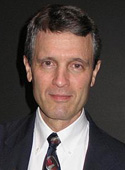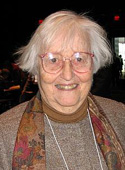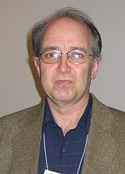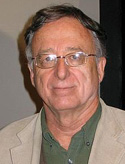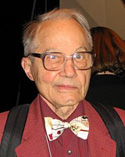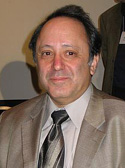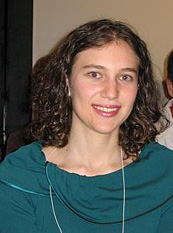- About MAA
- Membership
- MAA Publications
- Periodicals
- Blogs
- MAA Book Series
- MAA Press (an imprint of the AMS)
- MAA Notes
- MAA Reviews
- Mathematical Communication
- Information for Libraries
- Author Resources
- Advertise with MAA
- Meetings
- Competitions
- Programs
- Communities
- MAA Sections
- SIGMAA
- MAA Connect
- Students
- MAA Awards
- Awards Booklets
- Writing Awards
- Teaching Awards
- Service Awards
- Research Awards
- Lecture Awards
- Putnam Competition Individual and Team Winners
- D. E. Shaw Group AMC 8 Awards & Certificates
- Maryam Mirzakhani AMC 10 A Awards & Certificates
- Two Sigma AMC 10 B Awards & Certificates
- Jane Street AMC 12 A Awards & Certificates
- Akamai AMC 12 B Awards & Certificates
- High School Teachers
- News
You are here
Prizes and Awards at the Joint Mathematics Meetings in San Antonio
Deborah and Franklin Tepper Haimo Award for Distinguished College or University Teaching of Mathematics
Jacqueline Dewar
|
Jacqueline Dewar has taught at Loyola Marymount University in Los Angeles for almost 32 years. During this time, as the Haimo citation states, her “enthusiasm, extraordinary energy, and clarity of thought have left a deep imprint on students, colleagues, her campus, and a much larger mathematical community.” Dewar has been deeply involved in several teacher education initiatives, in research on mathematics teaching and learning, and she has put new ideas into practice with great success. At LMU she has introduced several “laboratory” courses, ranging from Mathematics for Elementary Teachers to a Workshop course aimed at first-year mathematics majors. The latter course helps introduce students to mathematics and is often a crucial factor in retaining them in the major and helping them succeed. Dewar is now involved in a new project called Science Education for New Civic Engagements and Responsibilities, redesigning core mathematics courses with a view to enhancing students’ quantitative literacy |
Keith Stroyan
|
Keith Stroyan has taught at the University of Iowa for over 30 years. He was a pioneer in the introduction of technology and computers into calculus courses, but he does not use these tools merely to draw pretty pictures or to allow students to avoid learning to compute. Instead, he focuses on a concrete, experiential approach, “using computer projects to engage teams of students in investigating concrete applications of mathematics.” One of his projects, for example, asks students to investigate the question: “Why did we eradicate polio by vaccination, but not measles?” Since he uses teaching assistants in this course, Stroyan has also trained many graduate and undergraduate students in this style of teaching, thus extending the influence of his ideas. Stroyan was, of course, deeply involved in the “calculus reform” movement, received grants to develop materials, and written textbooks, all of which emphasize the role of mathematics as “the language of science.” |
Judy Leavitt Walker
|
Judy Walker joined the faculty at the University of Nebraska – Lincoln in 1996; in a few short years has already had significant impact on both her institution and the larger mathematical community. Students “testify that her courses are among the most demanding they ever had, yet consistently praise her ability to guide the direction of a class through questions.” She created a first-year seminar for non-majors, The Joy of Numbers: Search for Big Primes, which was later adapted for use with elementary and middle-school teachers also. The course leads students to discover number theory for themselves; after class, Walker produces a report on what has been achieved by the students that day, recording examples worked out by students, questions and their answers, and theorems proved. At the end of the semester, students receive a copy of the book they have helped write. Walker has also been deeply involved in the ALL GIRLS/ALL MATH program, aimed at high school students, worked with undergraduate women mathematics students, and is currently working on a project focused on mentoring graduate students through critical transitions |
Section Certificate of Meritorious Service
Kay Somers
|
The Eastern Pennsylvania-Delaware Section (EPADEL) honored Kay Somers of Moravian College for her many years of service to the EPADEL section and to the wider MAA community. Kay has worked in both academia and industry, and this has given her a unique perspective. She has held almost every office in the section. Nationally, she has been on many crucial committees, including the Committee on Undergraduate Students Activities and Chapters and the Membership Committee. |
William Yslas Vélez
|
The Southwestern Section honored William Yslas Vélez of the University of Arizona for his long time service to the MAA and to the mathematics profession, noting in particular his “longstanding passion” for “opening the doors to mathematics and the sciences for underrepresented groups and attracting students to the mathematics major.” Vélez has been tireless in this cause, and his worked has been recognized nation-wide; for example, in 1997 he received the President’s Award for Excellence in Science, Mathematics and Engineering Mentoring Program. As the citation says, his many contributions to the MAA and to mathematics as a whole “can be characterized as unselfish, generous, passionate, high quality and inspiring.” |
Alan Tucker
|
The Metropolitan New York Section recognized Alan Tucker of the Applied Mathematics Department at SUNY Stony Brook. Tucker has been involved in all parts of the work of MAA since the 1970s. He has served as both Chair and Governor of his Section, but also as First Vice-President of the Association and on countless MAA committees. In his response, Tucker noted that both his father and his grandfather were presidents of the MAA, and that as he became involved with MAA committees he “learned quickly why my father and grandfather so enjoyed service with MAA.” |
Marjorie Enneking
|
The Pacific Northwest Section recognized Marjorie Enneking of Portland State University. Enneking has held many different offices in the section and has been an active participant in section meetings. After having spent some time at NSF, she shared much valuable information with section members. She was also involved with the Section’s NExT program during its early years, serving as a consultant. “Her voluminous service record and accomplishments are of the highest order.” |
Ivy Knoshaug
|
The North Central Section honored Ivy Knoshaug of Bemidji State University, where she has played a leading role as a teacher and innovator. At the section level, she has held many different offices, and has become, as the citation says, “someone we all count on. She is one of our stalwart members and personifies our section at its best.” |
Calvin (Cal) Van Niewaal
|
The Iowa Section honored of Coe College, who has been an active member of the section for almost 25 years, serving as chair, newsletter editor, and liaison coordinator. During much of this period he has been either a member of or an advisor to the Executive Committee, providing strong leadership and valuable institutional memory. |
Beckenbach Prize
Arthur Benjamin and Jennifer Quinn
|
The Beckenbach Book Prize, established in 1986, is the successor to the MAA Book Prize which was established in 1982. This prize is awarded to an author of a distinguished, innovative book published by the MAA. The winning book is an introduction to combinatorial proofs and counting arguments. “Few mathematicians are immune to the limpid charms of a clever counting argument,” says the citation, noting that such charms are in abundant display in the book by Benjamin and Quinn. “There is something here for every fan of counting. For example, do you know how many odd numbers there are in the 76th row of Pascal’s Triangle? Do you know what happens when you reverse the order of the terms in a finite continued fraction? Proofs That Really Count illustrates in a magical way the pervasiveness and power of counting techniques throughout mathematics. It is one of those rare books that will appeal to the mathematical professional and seduce the neophyte.” |
Chauvenet Prize
Florian Pfender and Günter M. Ziegler
|
The Chauvenet Prize is awarded at the Annual Meeting of the Association to the author of an outstanding expository article on a mathematical topic by a member of the Association. This year’s winner is Pfender and Ziegler’s paper on “Kissing Numbers, Sphere Packings, and Some Unexpected Proofs” (Notices of the American Mathematical Society, September 2004, pp. 873-883), which the citation describes as a “lucid and beautifully illustrated paper” that reports “on the history and progress of three classical packing problems in various dimensions: the kissing number problem, the sphere packing problem, and the lattice packing problem.” |
Yueh-Gin Gung and Dr. Charles Y. Hu Distinguished Service to Mathematics
Hyman Bass
|
The Yueh-Gin Gung and Dr. Charles Y. Hu Award for Distinguished Service to Mathematics is the most prestigious award made by the Association. This award, consisting of a cash prize of $4000, a citation, and recognition by the American mathematics community, was first given in 1990. The Yueh-Gin Gung and Dr. Charles Y. Hu Award is the successor to the Award for Distinguished Service to Mathematics, awarded since 1962, and has been made possible by the late Dr. Hu and his wife, Yueh-Gin Gung. It is worth noting that Dr. Hu was not a mathematician. He was a retired professor of geology at the University of Maryland. He had such strong feelings about the basic nature of mathematics and its importance in all human endeavors that he felt impelled to contribute generously to our discipline.This year’s award went to Hyman Bass, who is currently the Roger Lyndon Collegiate Professor of Mathematics and Professor of Mathematics Education at the University of Michigan. A complete citation and biography will appear in the March issue of the American Mathematical Monthly. |
Frank and Brennie Morgan Prize for Outstanding Research in Mathematics by an Undergraduate Student
Jacob Fox
|
The winner of the 2005 Morgan Prize for Outstanding Research in Mathematics by an Undergraduate is Jacob Fox. Jacob Fox (previously Jacob Licht) is now in his fourth year of undergraduate studies at M.I.T. The award is based on a most astounding collection of research papers by any undergraduate mathematician. Jacob Fox’s research is in three areas: Ramsey-type problems, rainbow patterns in colorings of the integers or Z/mZ, and other problems in graph theory (namely on discrepancy, clique number, embedding, and diameter). Jacob Fox is an excellent problem solver, passionately interested in these subjects, driven by his love of mathematics, his talents and his originality. He communicates easily and frequently collaborates with a variety of distinguished researchers. He also frequently publishes alone. Jacob Fox’s research exhibits a formidable ability to get to the heart of the issues in the problems at hand, and the ability to develop extremely ingenious and novel techniques. In addition to being able to solve problems posed by others, Fox has also excelled at finding topics all by himself, formulating novel conjectures and approaches to solutions. His accomplishments are shaping his areas of research, and are of extraordinary promise for the future. |
Joint Policy Board for Mathematics Communications Award
Sir Roger Penrose
|
The JPBM, whose members are MAA, AMS, SIAM, and ASA, created this award to honor those who have made significant contributions to public understanding of mathematics. Sir Roger Penrose was honored “for the discovery of Penrose tilings, which have captured the public’s imagination, and for an extraordinary series of books that brought the subject of consciousness to the public in mathematical terms.” Citing his books The Emperor’s New Mind and The Road to Reality, JPBM noted that Penrose has made high-level mathematical ideas accessible and relevant to the general public. In his response, Penrose said, “Science in general, and mathematics in particular, have grown to enormous proportions over the years, and over the centuries. Semi-popular expositions which give clear and intuitive accounts of one area of work can be an invaluable aid to others whose expertise may lie in some area of science or mathematics which is far from that being explained. In my own experience, such accounts can have enormous value. If, as this award seems to imply, I have contributed, in some significant way, to the spreading of scientific or mathematical knowledge and understanding, then I am indeed well pleased.” |
Award for Distinguished Public Service
Roger Howe
|
This award recognizes a research mathematician who has made substantial contributions to the mathematics profession. Roger Howe was honored “for his multifaceted contributions to mathematics and to mathematics education.” Noting that Howe is a respected research mathematician and professor at Yale, the citation focuses on his leadership role in several national initiatives related to the teaching of mathematics and the mathematical education of teachers. As the citation notes, “Howe has worked diligently over the years to broaden and professionalize the involvement of a research mathematician in educational reform.” Within the AMS, at the National Academy of Science and the National Research Council, and in Connecticut, Howe has been involved and effective, earning the respect of mathematicians and educators alike. |
George David Birkhoff Prize in Applied Mathematics
Cathleen Synge Morawetz
|
This prize, established in 1967 in honor of George David Birkhoff, is awarded by the AMS and SIAM for an outstanding contribution to “applied mathematics in the highest and broadest sense.” This year’s prize went to Cathleen Synge Morawetz for her deep and influential work in partial differential equations, most notably in the study of shock waves, transonic flow, scattering theory, and conformally invariant estimates for the wave equation. |
Frank Nelson Cole Prize in Algebra
János Kollár
|
The 2006 Cole Prize in Algebra was awarded to János Kollár of Princeton University for his outstanding achievements in the theory of rationally connected varieties and for his illuminating work in which he found counter examples to a well-known conjecture of Nash. |
Leroy P. Steele Prize for Seminal Contribution to Research
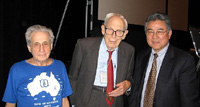 |
Martin D. Kruskal, Clifford S. Gardner, Robert M. Miura, not pictured:John M. Green |
Leroy P. Steele Prize for Lifetime Achievement
Dennis Sullivan
|
Dennis Sullivan received the lifetime achievement award in honor of his many contributions to mathematics. The citation notes that Sullivan “has reinvented himself many times,” deeply influencing (even shapring the development of) homotopy theory, low-dimensional topology, the study of Kleinian groups, and dynamical systems. The citation adds that “These brief remarks do not do justice to the scope of Sullivan’s ideas and influence. Beyond the specific theories he has developed and the problems he has solved — and there are many |
Frederick W. Gehring
|
F. W. Gehring was honored for his fifty-year career during which he was a leader in the study of quasi-conformal mappings. The central theorem in the two-dimensional theory was proved by him, and his work is also the foundation of the higher-dimensional theory. Through his papers and his work with his 29 doctoral students, he has had a deep influence on many areas of mathematics. In his response, Gehring said that he had learned a lot from his students and from post-doctoral fellows who had worked with him: “Indeed I would feel quite remiss in accepting this award without acknowledging how much I owe to them. So now I thank you for this award which I accept in their names also.” |
Leroy P. Steele Prize for Mathematical Exposition
Lars V. Hörmander |
The Leroy Steele Prize for Exposition went to Lars V. Hörmander for his four-volume work on The Analysis of Linear Partial Differential Operators, “a compendium of practically all of the exciting developments that occurred in the theory of linear partial differential equations and in the area of microlocal analysis in the period 1960–1985.” Recently reprinted by Springer, this work is a shining example of exposition does not simply recount known results, but rather re-envisions the whole field in a “profound and masterful” way. |
Levi L. Conant Prize
Ronald M. Solomon
|
The Levi Conant Prize for the best expository paper in either the Notices or the Bulletin of the AMS went to Ronald Solomon for his paper “A Brief History of the Classification of the Finite Simple Groups,” Bulletin of the AMS 38 (2001), no. 3, 315–352. The citation describes the paper as “a remarkable overview of the work on the classification problem, from its inception in an 1893 paper by Otto Hölder to the recent two-volume proof of the final theorem by Michael Ashbacher and Stephen Smith.” |
Award for an Exemplary Program or Achievement in a Mathematics Department
Harvey Mudd College |
This is a new prize, established in 2004 and awarded for the first time this year. It aims “to recognize a department which has distinguished itself by undertaking an unusual or particularly effective program of value to the mathematics community, internally or in relation to the rest of society.” The first award went to Harvey Mudd College, noting the many successes of its mathematics department. |
Summer Institute in Mathematics for Undergraduates (SIMU) REU program at the Universidad de Puerto Rico, HumacaoGraduate Program, Department of Mathematics, University of Iowa |
This is a new award, in which the AMS will recognize programs that have made a significant contribution towards attracting and retaining mathematicians from under-represented minority groups. Each year the AMS will recognize two programs. See page xx for the full citation. |
Alice T. Shafer Prize for Excellence in Mathematics by an Undergraduate Woman
Alexandra Ovetsky
|
Alexandra Ovetsky, a senior at Princeton University is also a Goldwater scholar and the recipient of the Princeton mathematics department’s Andrew H. Brown Prize for outstanding research in mathematics as a junior. Her coauthored paper “Surreal dimensions” has been published in Advances in Applied Mathematics. Ovetsky was a participant in the REU program at the University of Minnesota at Duluth, where she did “professional-level” work in graph theory. The citation quotes one of her recommenders as saying that “She already has the research capabilities of an advanced graduate student or junior faculty member.” |
Louise Hay Award for Contributions to Mathematics Education
Patricia Clark Kenschaft
|
The purpose of this award is to recognize outstanding achievements in any area of mathematics education. Pat Kenschaft received the award for her extensive work on all aspects of mathematics education, and especially for her work on equity and environmental issues |
id:
4574
News Date:
Wednesday, January 18, 2006

